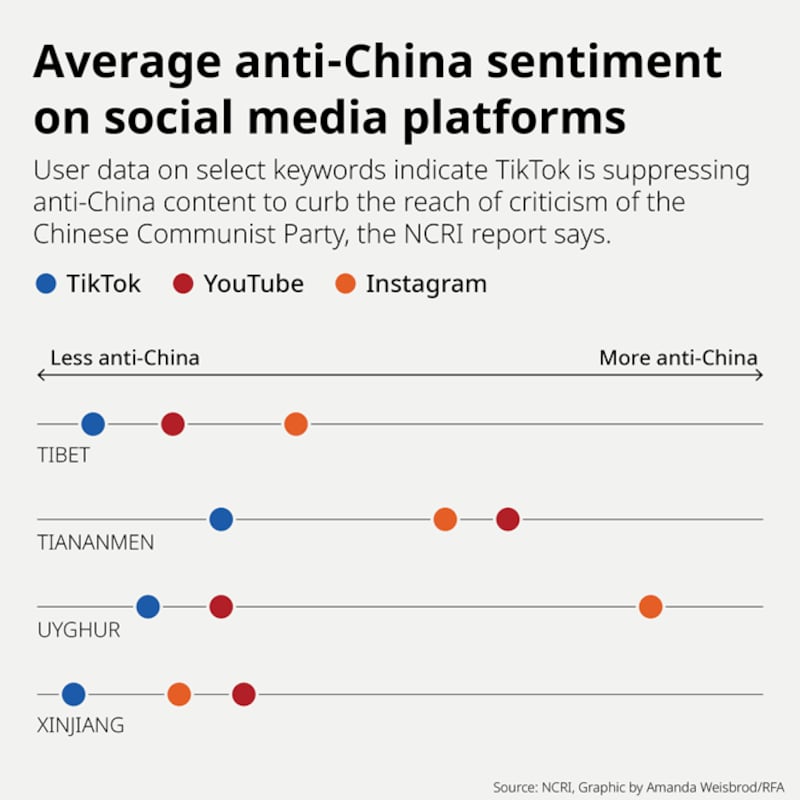TikTok algorithms promote the Chinese government’s narratives on hot-button issues such as Tibet, Taiwan and the Uyghurs — while suppressing content critical of Beijing, a new study has found.
When users search for terms on TikTok — owned by Chinese company ByteDance — that are sensitive to the ruling Chinese Communist Party, or CCP, such as “Tibet” and “Taiwan,” the results show much more content that is pro-China than content that is critical of China, researchers found.
Compared to similar searches on Instagram and YouTube, the results showed a pronounced pro-Beijing bias, according to the study, titled "The CCP's Digital Charm Offensive," by the Network Contagion Research Institute, or NCRI, at Rutgers University.
The findings, “while not definitive proof of state orchestration, present compelling and strong circumstantial evidence of TikTok’s covert content manipulation,” wrote NCRI co-founder Joel Finkelstein in the report.
Swaying youth
The study mimicked the user journeys of American 16-year-olds based on the newly created accounts that were used to test the three platforms’ search algorithm results, the report said.
The findings point to attempts by the Chinese government to shape public opinion — particularly among youth — on human rights and political issues, experts said.

Tibetan and Uyghur activists say that such bias obfuscates China’s oppression of Tibetans and Uyghurs and its attempts to undermine or wipe out their languages and cultures.
Constant exposure to TikTok’s pro-Beijing content is “a significant threat and concern,” said Lobsang Gyatso Sither, a member of the Tibetan parliament-in-exile and directorof technology at theTibet Action Institute.
Rushan Abbas, executive director of the Campaign for Uyghurs, said that the research shows a “strong possibility” of content suppression or amplification to align with Beijing’s interests.
“The CCP is responsible for the Uyghur genocide and the oppression of the people of Hong Kong and Tibet,” she said.
Beijing is using social media “in their campaign of transnational repression, harassing human rights defenders living outside of China,” she said.
TikTok users also say that the short-form mobile video app has censored comments deemed critical of Beijing.

One young Uyghur user who wanted to remain nameless said that last November, after the outbreak of conflict between Israel and Hamas in Gaza, Chinese officials said on social media that a genocide was happening in Gaza but not in Xinjiang, home to some 11 million Uyghurs.
“I posted a comment in Arabic saying China was actually committing genocide against Uyghur Muslims in Xinjiang,” he said. “My comment was soon removed by TikTok. I was quite shocked. Apparently, TikTok didn't want the Muslim world to know about the Uyghur genocide.”
Rejecting criticism
A TikTok spokesperson rejected the study, saying it was a “non-peer reviewed, flawed experiment … clearly engineered to reach a false, predetermined conclusion.”
"Previous research by NCRI has been debunked by outside analysts, and this latest paper is equally flawed," the spokesperson, who asked that his name not be published, told RFA in an email.
“Creating fake accounts that interact with the app in a prescribed manner does not reflect real users' experience, just as this so-called study does not reflect facts or reality.”
“One would hope media outlets would apply journalistic standards and rigor to fact check this type of fiction before rushing to publication,” he wrote.
Concerns about Beijing’s influence over TikTok are not new.
Since 2020, the Indian government has imposed a ban on more than 232 Chinese apps, including TikTok.
As of 2023, some 34 U.S. states enacted policies prohibiting government agencies and officials, including contract employees, from using TikTok. This year, the U.S. Congress passed legislation banning TikTok unless it is sold to a government-approved buyer. There are ongoing hearings about the potential for a ban of the app across the U.S.
RELATED STORIES
No TokTok in Tibetan (CARTOON)
[ Biden signs TikTok ban billOpens in new window ]
[ China bans Uyghurs from using social media appsOpens in new window ]
[ US bill targeting TikTok sparks mixed reactions in ChinaOpens in new window ]
The NCRI research found that when using TikTok to search for terms such as “Tibet,” “Tibet,” “Uyghurs” or “1989 Tiananmen Massacre,” between 61% and 93% of the results were either pro-China or irrelevant, while anti-China content constituted only 5%.
By comparison, pro-China content made up 13.7% of content on YouTube and 27.7% on Instagram, the study showed.
In December 2023, the NCRI published its first report on TikTok which showed a strong possibility that content on the video-sharing app was being either amplified or suppressed based on the alignment with Chinese government narratives.
Influence tool
The Chinese government uses TikTok as a strategic tool to influence other countries, particularly young people, in an effort to shift their perceptions of China, said Vinayak Bhatt, an Indian defense analyst and former army general.
“This includes promoting the idea that China’s economic growth is due not only to hard work but also to strategic government planning,” he said.
Many Gen Z users of TikTok say they are aware of the Chinese government’s biases and potential for content manipulation on the app, but choose to use it for recreational purposes.
“My page doesn’t have any political content, so when I think of TikTok, I view it as more recreational, but I also have a subconscious awareness that when I see anything pro-China or political, that it may be influenced,” said Tenzin Khando, a 20-year-old Tibetan student from New York, who has had a TikTok account since 2019.

Dolma Lhamo, a 25-year-old Tibetan resident of Orissa, India, recalled an issue with TikTok in 2019 when she posted a picture of the Dalai Lama and a note of appreciation on the platform on his birthday, but the post was blocked and did not appear.
Lhamo, who created her TikTok account about 10 years ago, expressed concern about the incident and said she stopped posting anything related to Tibet.
Most TikTok Gen Z users say they are subconsciously aware of the Chinese government’s biases and potential for content manipulation on the app, but choose to use it for recreational purposes.
But Chemi Lhamo, a Tibetan-Canadian human rights activist and campaign director at Students for a Free Tibet, said she avoids apps and digital platforms created by the Chinese government because she doesn't trust them.
“I also advise others against using such platforms due to concerns about bias,” she said.
Language restrictions
Dawa Tsering, director of the Tibetan Policy Institute in Dharamsala, India, told RFA that the prohibition of Tibetan language on ByteDance’s Douyin, the Chinese version of the TikTok app available to Tibetans inside Tibet and others in China, is indicative of a broader policy to eradicate the Tibetan language.
He said these restrictions are in line with Chinese government orders to suppress Tibetan culture and language, with social media platforms like TikTok actively supporting this policy of cultural eradication.
Douyin has become a key platform for the Chinese authorities to distribute information and propaganda. Like other social media services in China, Douyin adheres to the censorship regulations set by the CCP.
Additional reporting by Lobe Socktsang, Dickey Kundol, Yangdon Demo, Khando Yangzom, and Tenzin Dickyi for RFA Tibetan, and by RFA Uyghur. Translated by Tenzin Dickyi and edited by Tenzin Pema for RFA Tibetan. Edited by Roseanne Gerin and Malcolm Foster.
